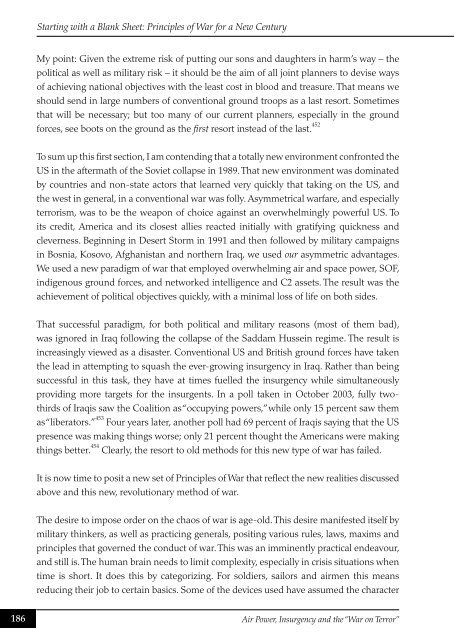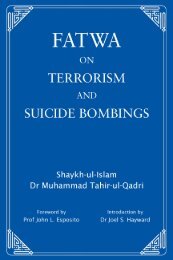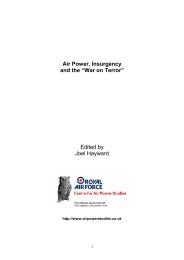Air Power, Insurgency and the âWar on Terrorâ - Prof. Joel Hayward's ...
Air Power, Insurgency and the âWar on Terrorâ - Prof. Joel Hayward's ...
Air Power, Insurgency and the âWar on Terrorâ - Prof. Joel Hayward's ...
Create successful ePaper yourself
Turn your PDF publications into a flip-book with our unique Google optimized e-Paper software.
Starting with a Blank Sheet: Principles of War for a New Century<br />
My point: Given <str<strong>on</strong>g>the</str<strong>on</strong>g> extreme risk of putting our s<strong>on</strong>s <str<strong>on</strong>g>and</str<strong>on</strong>g> daughters in harm’s way – <str<strong>on</strong>g>the</str<strong>on</strong>g><br />
political as well as military risk – it should be <str<strong>on</strong>g>the</str<strong>on</strong>g> aim of all joint planners to devise ways<br />
of achieving nati<strong>on</strong>al objectives with <str<strong>on</strong>g>the</str<strong>on</strong>g> least cost in blood <str<strong>on</strong>g>and</str<strong>on</strong>g> treasure. That means we<br />
should send in large numbers of c<strong>on</strong>venti<strong>on</strong>al ground troops as a last resort. Sometimes<br />
that will be necessary; but too many of our current planners, especially in <str<strong>on</strong>g>the</str<strong>on</strong>g> ground<br />
forces, see boots <strong>on</strong> <str<strong>on</strong>g>the</str<strong>on</strong>g> ground as <str<strong>on</strong>g>the</str<strong>on</strong>g> first resort instead of <str<strong>on</strong>g>the</str<strong>on</strong>g> last. 452<br />
To sum up this first secti<strong>on</strong>, I am c<strong>on</strong>tending that a totally new envir<strong>on</strong>ment c<strong>on</strong>fr<strong>on</strong>ted <str<strong>on</strong>g>the</str<strong>on</strong>g><br />
US in <str<strong>on</strong>g>the</str<strong>on</strong>g> aftermath of <str<strong>on</strong>g>the</str<strong>on</strong>g> Soviet collapse in 1989. That new envir<strong>on</strong>ment was dominated<br />
by countries <str<strong>on</strong>g>and</str<strong>on</strong>g> n<strong>on</strong>-state actors that learned very quickly that taking <strong>on</strong> <str<strong>on</strong>g>the</str<strong>on</strong>g> US, <str<strong>on</strong>g>and</str<strong>on</strong>g><br />
<str<strong>on</strong>g>the</str<strong>on</strong>g> west in general, in a c<strong>on</strong>venti<strong>on</strong>al war was folly. Asymmetrical warfare, <str<strong>on</strong>g>and</str<strong>on</strong>g> especially<br />
terrorism, was to be <str<strong>on</strong>g>the</str<strong>on</strong>g> weap<strong>on</strong> of choice against an overwhelmingly powerful US. To<br />
its credit, America <str<strong>on</strong>g>and</str<strong>on</strong>g> its closest allies reacted initially with gratifying quickness <str<strong>on</strong>g>and</str<strong>on</strong>g><br />
cleverness. Beginning in Desert Storm in 1991 <str<strong>on</strong>g>and</str<strong>on</strong>g> <str<strong>on</strong>g>the</str<strong>on</strong>g>n followed by military campaigns<br />
in Bosnia, Kosovo, Afghanistan <str<strong>on</strong>g>and</str<strong>on</strong>g> nor<str<strong>on</strong>g>the</str<strong>on</strong>g>rn Iraq, we used our asymmetric advantages.<br />
We used a new paradigm of war that employed overwhelming air <str<strong>on</strong>g>and</str<strong>on</strong>g> space power, SOF,<br />
indigenous ground forces, <str<strong>on</strong>g>and</str<strong>on</strong>g> networked intelligence <str<strong>on</strong>g>and</str<strong>on</strong>g> C2 assets. The result was <str<strong>on</strong>g>the</str<strong>on</strong>g><br />
achievement of political objectives quickly, with a minimal loss of life <strong>on</strong> both sides.<br />
That successful paradigm, for both political <str<strong>on</strong>g>and</str<strong>on</strong>g> military reas<strong>on</strong>s (most of <str<strong>on</strong>g>the</str<strong>on</strong>g>m bad),<br />
was ignored in Iraq following <str<strong>on</strong>g>the</str<strong>on</strong>g> collapse of <str<strong>on</strong>g>the</str<strong>on</strong>g> Saddam Hussein regime. The result is<br />
increasingly viewed as a disaster. C<strong>on</strong>venti<strong>on</strong>al US <str<strong>on</strong>g>and</str<strong>on</strong>g> British ground forces have taken<br />
<str<strong>on</strong>g>the</str<strong>on</strong>g> lead in attempting to squash <str<strong>on</strong>g>the</str<strong>on</strong>g> ever-growing insurgency in Iraq. Ra<str<strong>on</strong>g>the</str<strong>on</strong>g>r than being<br />
successful in this task, <str<strong>on</strong>g>the</str<strong>on</strong>g>y have at times fuelled <str<strong>on</strong>g>the</str<strong>on</strong>g> insurgency while simultaneously<br />
providing more targets for <str<strong>on</strong>g>the</str<strong>on</strong>g> insurgents. In a poll taken in October 2003, fully twothirds<br />
of Iraqis saw <str<strong>on</strong>g>the</str<strong>on</strong>g> Coaliti<strong>on</strong> as “occupying powers,” while <strong>on</strong>ly 15 percent saw <str<strong>on</strong>g>the</str<strong>on</strong>g>m<br />
as “liberators.” 453 Four years later, ano<str<strong>on</strong>g>the</str<strong>on</strong>g>r poll had 69 percent of Iraqis saying that <str<strong>on</strong>g>the</str<strong>on</strong>g> US<br />
presence was making things worse; <strong>on</strong>ly 21 percent thought <str<strong>on</strong>g>the</str<strong>on</strong>g> Americans were making<br />
things better. 454 Clearly, <str<strong>on</strong>g>the</str<strong>on</strong>g> resort to old methods for this new type of war has failed.<br />
It is now time to posit a new set of Principles of War that reflect <str<strong>on</strong>g>the</str<strong>on</strong>g> new realities discussed<br />
above <str<strong>on</strong>g>and</str<strong>on</strong>g> this new, revoluti<strong>on</strong>ary method of war.<br />
The desire to impose order <strong>on</strong> <str<strong>on</strong>g>the</str<strong>on</strong>g> chaos of war is age-old. This desire manifested itself by<br />
military thinkers, as well as practicing generals, positing various rules, laws, maxims <str<strong>on</strong>g>and</str<strong>on</strong>g><br />
principles that governed <str<strong>on</strong>g>the</str<strong>on</strong>g> c<strong>on</strong>duct of war. This was an imminently practical endeavour,<br />
<str<strong>on</strong>g>and</str<strong>on</strong>g> still is. The human brain needs to limit complexity, especially in crisis situati<strong>on</strong>s when<br />
time is short. It does this by categorizing. For soldiers, sailors <str<strong>on</strong>g>and</str<strong>on</strong>g> airmen this means<br />
reducing <str<strong>on</strong>g>the</str<strong>on</strong>g>ir job to certain basics. Some of <str<strong>on</strong>g>the</str<strong>on</strong>g> devices used have assumed <str<strong>on</strong>g>the</str<strong>on</strong>g> character<br />
186<br />
<str<strong>on</strong>g>Air</str<strong>on</strong>g> <str<strong>on</strong>g>Power</str<strong>on</strong>g>, <str<strong>on</strong>g>Insurgency</str<strong>on</strong>g> <str<strong>on</strong>g>and</str<strong>on</strong>g> <str<strong>on</strong>g>the</str<strong>on</strong>g> “War <strong>on</strong> Terror”





